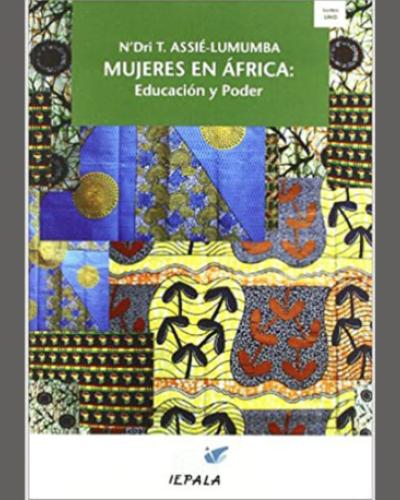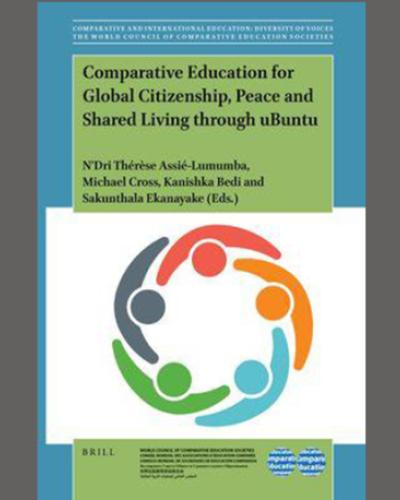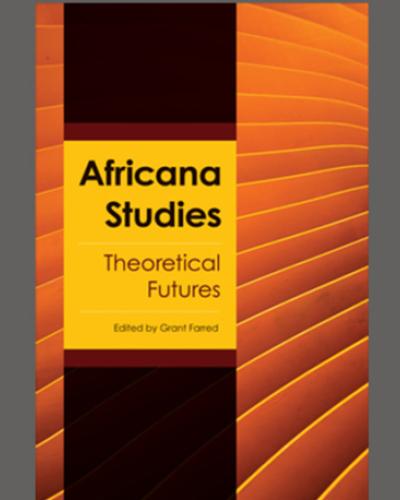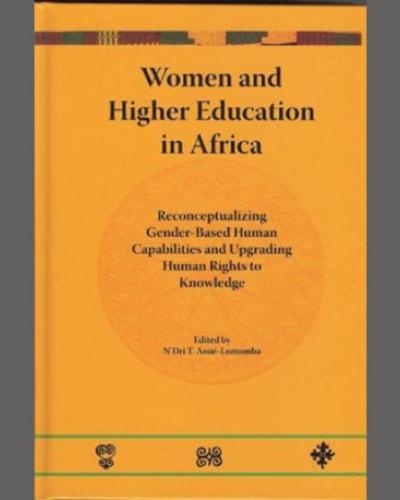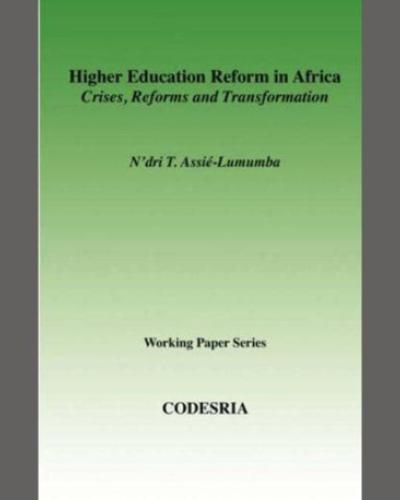Comparative Education for Global Citizenship, Peace and Shared Living through uBuntu
There is a dire need today to create spaces in which people can make meaning of their existence in the world, abiding by cultural frameworks and practices that acknowledge and validate a meaningful existence for all. People are not just isolated individuals but are connected in diverse ways with other persons within our natural and social environment which is part of the whole universe. The African philosophy of uBuntu or humaneness is re-emerging for its timely relevance and potential as indispensable in our quest for global citizenship, peace, and mutual understanding in securing sustainable human development in the broader ecosystem.
Comparative educationists have the challenge to devise theoretical frameworks, epistemological and pedagogical constructs as well as pragmatic, useful and effective ways of promoting the virtues of compassion and recognition of our common humanity in eliminating the ills of domination and control that are guided by greed, hatred, jealousy, and intolerance.
Comparative Education for Global Citizenship, Peace and Shared Living through Ubuntu paves the way for a better understanding of the critical importance of the collective search and endeavor towards achieving the virtues of nonviolence, peace, shared values of living together, global citizenship, improved quality of life for all and a better appreciation of the positive implications of interdependence.
Africana Studies Theoretical Futures
As Africana Studies celebrates its fiftieth anniversary throughout the United States, this invigor ating collection presents possibilities for the future of the discipline’s theoretical paths. The essays in Africana Studies focus on philosophy, science, and technology; poetry, literature, and music; the crisis of the state; issues of colonialism, globalization, and neoliberalism; and the ever-expanding diaspora. The editor and contributors to this volume open exciting avenues for new narratives, philosophies, vision, and scale in this critical field of study—formed during the 1960s around issues of racial injustice in America—to show what Africana Studies is already in the process of becoming.
Africana Studies recognizes how the discipline has been shaped, changing over the decades as scholars have opened new modes of theoretical engagement such as addressing issues of gender and sexuality, politics, and cultural studies. The essays debate and (re)consider black and diasporic life to sustain, provoke, and cultivate Africana Studies as a singular yet polyvalent mode of thinking.
Contributors: Akin Adeṣọkan, John E. Drabinski, Zeyad El Nabolsy, Pierre-Philippe Fraiture, Kasareka Kavwahirehi, Gregory Pardlo, Radwa Saad, Sarah Then Bergh, and the editor
Against Decolonisation, Taking African Agency Seriously
Decolonisation has lost its way. Originally conceived as a struggle to escape the West’s direct political and economic control, it has become a catch-all idea, often used to perform contemporary ‘morality’ or ‘authenticity’. In the process, it suffocates African thought, and denies African agency.
Olúfẹ́mi Táíwò fiercely rejects the indiscriminate application of ‘decolonisation’ to everything from literature, language and philosophy to sociology, psychology and medicine. He argues that the decolonisation industry, obsessed with exposing slights and cataloguing wrongs, is seriously harming scholarship on and in Africa. He finds decolonisation as applied to culture intellectually unsound and wholly unrealistic, conflating modernity with coloniality, and groundlessly advocating an open-ended undoing of global society’s foundations. Worst of all, today’s movement attacks its own proclaimed cause: ‘decolonisers’ themselves are disregarding, infantilising and imposing values on contemporary African thinkers.
This powerful, much-needed intervention questions whether today’s ‘decolonisation’ truly serves African empowerment. Táíwò’s is a bold challenge to all concerned for Africa’s future: to resist sweeping moralities, and grant the respect due to African intellectuals as innovative adaptors, appropriators and synthesisers of ideas they have always seen as universally relevant. It’s time to reclaim decolonisation, within the constraints of what is measurable, achievable and desirable.
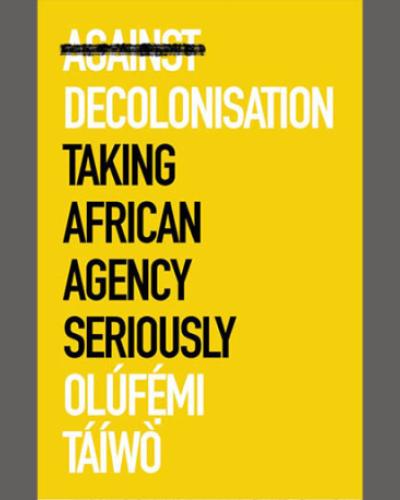
An Essay for Ezra: Racial Terror in America (Thinking Theory)
An Essay for Ezra is a critique of terror that begins but by no means ends with the presidency of Donald J. Trump. A father addresses his son and a boy shares his observations in a dynamic dialogistic exchange that is a commentary of and for its time, taking the measure of racial terror and of white supremacy both in our moment and as a historical phenomenon.
Framed through the experiences of the author's biracial son, An Essay for Ezra is intensely personal while also powerfully universal. Drawing on the social and political thought of James Baldwin and Martin Luther King, Grant Farred examines the temptation and the perils of essentialism and the need to discriminate--to engage the black mind as much as the black body. With that dialectic as his starting point, Farred engages the ideas of Jameson, Barthes, Derrida, Adorno, Kant, and other thinkers to derive an ethics of being in our time of social peril. His antiessentialist racial analysis is salient, especially when he deploys Dave Chappelle as a counterpoint to Baldwin--and Chappelle's brilliant comic philosophic voice jabs at both racial and gender identity.
Standing apart for its willingness to explore terror in all its ambivalence, this theoretical reflection on racism, knowledge, ethics, and being in our neofascist present brings to bear the full weight of philosophical inquiry and popular cultural critique on black life in the United States.

Pan-African Connections
Pan-African Connections brings to the reader a combination of Reflections and Testimonies from writers, politicians, activists, colleagues; with essays on intellectual activism, the building of Pan-African institutions and the voices of women in Panafricanism. Stories abound from writers such as Ngugi wa Thiong’o and Anyang’ Nyong’o about Locksley Edmondson, who is featured here, who like Walter Rodney, lived and worked on the African continent physically, but also engaged it politically, culturally and intellectually in teaching and research. The lives and work of these scholars embodied precisely the bringing together of African, Caribbean and African-American Studies in the intellectual arena. Through this generation of intellectual/activists, the rubric of Panfricanism remains one of the key areas of academic and political inquiry in Africana Studies.
Edited by Professor Carole Boyce-Davies, is the H.T. Rhodes Professor of Humane Letters and Professor N’Dri Thérèse Assié-Lumumba
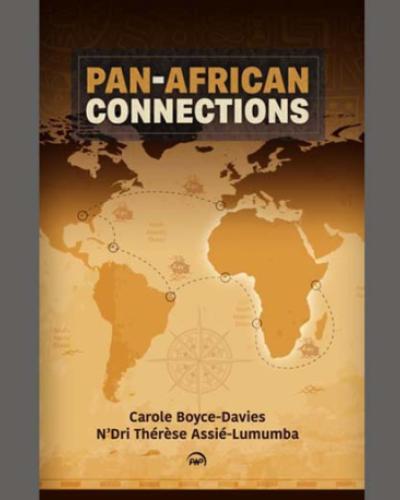
Emancipation's Daughters: Reimagining Black Femininity and the National Body
In Emancipation's Daughters, Riché Richardson examines iconic black women leaders who have contested racial stereotypes and constructed new national narratives of black womanhood in the United States. Drawing on literary texts and cultural representations, Richardson shows how five emblematic black women—Mary McLeod Bethune, Rosa Parks, Condoleezza Rice, Michelle Obama, and Beyoncé—have challenged white-centered definitions of American identity. By using the rhetoric of motherhood and focusing on families and children, these leaders have defied racist images of black women, such as the mammy or the welfare queen, and rewritten scripts of femininity designed to exclude black women from civic participation. Richardson shows that these women's status as national icons was central to reconstructing black womanhood in ways that moved beyond dominant stereotypes. However, these formulations are often premised on heteronormativity and exclude black queer and trans women. Throughout Emancipation's Daughters, Richardson reveals new possibilities for inclusive models of blackness, national femininity, and democracy.
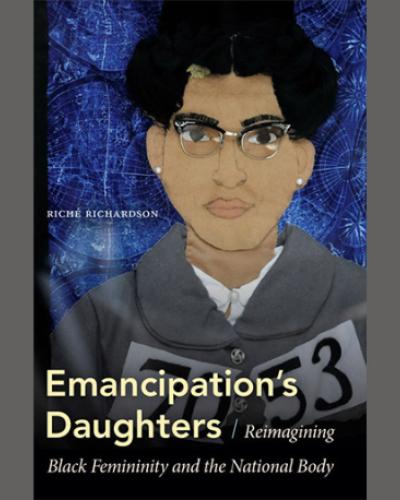
Education and Development: Outcomes for Equality and Governance in Africa 1st ed. 2020 Edition
This edited volume addresses a critical aspect of development in Africa: the intersection between education and governance. Using case studies and experiences from different parts of the continent, this book assesses how the potential for human resources, in terms of education, can be leveraged in the development process to achieve equity, inclusive development and governance outcomes in Africa. This book builds on the "resource curse" to focus on human resources as an alternative paradigm to sustainable development in Africa. At a time when concerns over access to quality education is an important issue among policy makers and international development agents, this timely project calls attention to one of the most critical aspects of development in Africa.
by
Publisher: Springer International Publishing
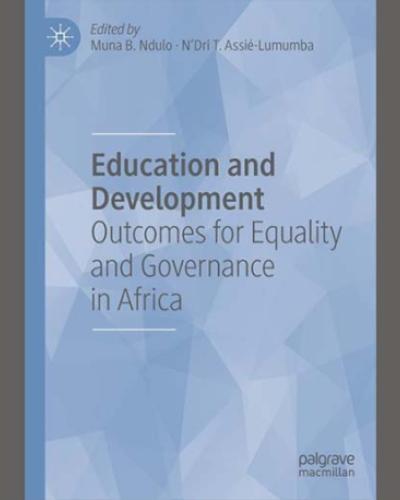
Midfielder's Moment: Coloured Literature And Culture In Contemporary South Africa
In Midfielder’s Moment, South African-born scholar Grant Farred explores the ways in which ideological differences and political fissures are being articulated in the “new” South Africa. By examining the politics, literature, and culture of an disenfranchised constituency—the colored community—this collection of essays sheds critical light on the current debates ragging within the new post-apartheid state.From an essay explicating the colored vote in the Western Cape, to a critical rethinking of the 1960s Protest Writers (how Richard Rive, Arthur Nortje, and Jennifer Davids can be understood in view of recent events), to an in-depth analysis of the way sports delineate the racial and class tensions underpinning the society, the book gives voice to a uniquely embattled people.The title of this project is taken only in part from the sports focus of three of the book’s essays—a midfielder refers to the intermediary but crucial position on a football team, one which links the defense to the attack. Midfielder’s Moment refers, more saliently, to the ambiguous location the colored community occupies on the South African political landscape. By identifying the precarious middle ground that colored South Africans occupy—between a newly enfranchised black majority and a historically empowered white minority— Midfielder’s Moment is a timely exploration of and intervention into the South African ideological landscape from the perspective of the colored community.
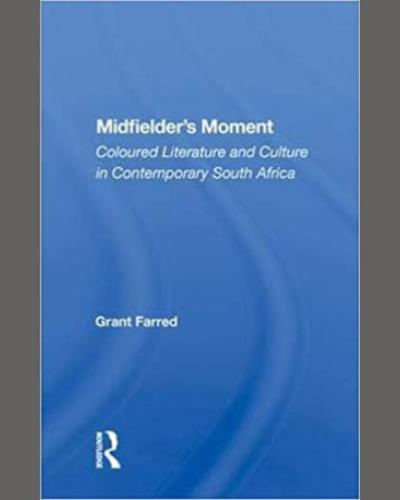
Derrida and Africa: Jacques Derrida as a Figure for African Thought (African Philosophy: Critical Perspectives and Global Dialogue)
Derrida and Africa takes up Jacques Derrida as a figure of thought in relation to Africa, with a focus on Derrida’s writings specifically on Africa, which were influenced in part by his childhood in El Biar. From chapters that take up Derrida as Mother to contemplations on how to situate Derrida in relation to other African philosophers, from essays that connect deconstruction and diaspora to a chapter that engages the ways in which Derrida—especially in a text such as Monolingualism of the Other: or, the Prosthesis of Origin—is haunted by place to a chapter that locates Derrida firmly in postapartheid South Africa, Derrida in/and Africa is the insistent line of inquiry. Edited by Grant Farred, this collection asks: What is Derrida to Africa?, What is Africa to Derrida?, and What is this specter called Africa that haunts Derrida?

Entre Nous - Between the World Cup and Me
In Entre Nous Grant Farred examines the careers of international football stars Lionel Messi and Luis Suarez, along with his own experience playing for an amateur township team in apartheid South Africa, to theorize the relationship between sports and the intertwined experiences of relation, separation, and belonging. Drawing on Jean-Luc Nancy's concept of relation and Heideggerian ontology, Farred outlines how various relationships—the significantly different relationships Messi has with his club team FC Barcelona and the Argentine national team; Farred's shifting modes of relation as he moved between his South African team and his Princeton graduate student team; and Suarez's deep bond with Uruguay's national team coach Oscar Tabarez—demonstrate the ways the politics of relation both exist within and transcend sports. Farred demonstrates that approaching sports philosophically offers particularly insightful means of understanding the nature of being in the world, thereby opening new paths for exploring how the self is constituted in its relation to the other.
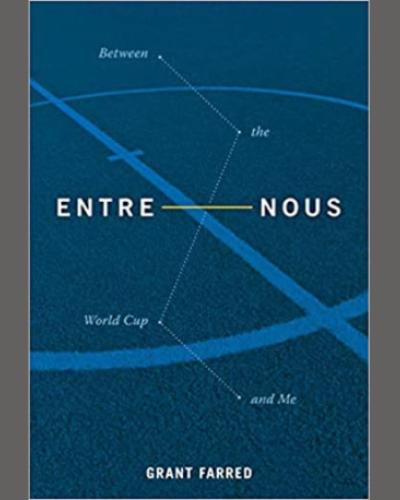
Ibrahim El-Salahi: Prison Notebook
Sudanese artist, writer, critic, cultural diplomat Ibrahim El-Salahi (born 1930) is one of the critical figures of African and Arabic modernism. While serving as Sudan’s Undersecretary of Culture in 1975, El-Salahi was imprisoned without trial and endured six months of deprivation in the notorious Cooper (now Kober) Prison. During a period of house arrest that followed, he exorcised his experience in the Prison Notebook, an intensely personal work that is both a major historical document and a masterpiece of drawing, its pages filled with remarkable pen-and-ink drawings that demonstrate the artist’s graphic mastery. This bilingual English-Arabic volume, published by The Museum of Modern Art and the Sharjah Art Foundation, comprises a facsimile of the Prison Notebook (recently acquired by MoMA); an English translation of its prose; a contextualizing essay by art historian Salah Hassan that addresses the social and political milieu in which it was produced; and contemporary commentary by the artist, captured in a recent interview.

The Burden of Over-representation: Race, Sport, and Philosophy
The Burden of Over-representation artfully explores three curious racial moments in sport: Jackie Robinson's expletive at a Dodgers spring training game; the transformation of a formality into an event at the end of the 1995 rugby World Cup in South Africa; and a spectral moment at the 2010 FIFA World Cup. Grant Farred examines the connotations at play in these moments through the lenses of race, politics, memory, inheritance and conciliation, deploying a surprising cast of figures in Western thought, ranging from Jacques Derrida and Friedrich Nietzsche to Judith Butler, William Shakespeare, and Jesus-the-Christ. Farred makes connection and creates meaning through the forces at play and the representational burdens of team, country and race.
Farred considers Robinson's profane comments at black Dodgers fans, a post-match exchange of "thank yous" on the rugby pitch between white South African captain François Pienaar and Nelson Mandela, and being "haunted" by the ghost of Derrida on the occasion of the first FIFA World Cup on African soil. In doing so, The Burden of Over-representation provides a passionate, insightful analysis of the social, political, racial, and cultural consequences of conciliation at key sporting events.
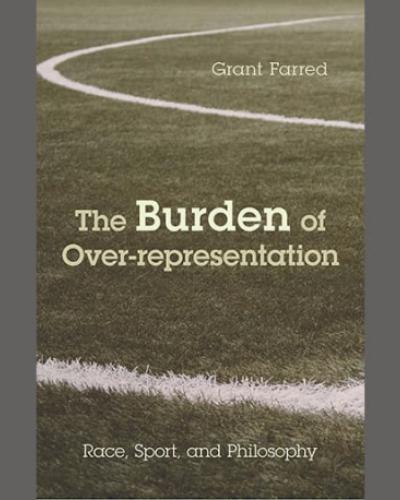
Re-Visioning Education in Africa: Ubuntu-Inspired Education for Humanity
This book presents the case for a conceptual and pragmatic revolution of Africa’s formal educational systems. Using the context of Ubuntu-inspired education, the authors explore innovative ways to tackle the challenges faced by governments from the local and national level and beyond. Along the way, the editors and their contributors examine important policy questions to encourage fresh thinking on ways to improve the educational system and, in turn, to buoy the development of the region as a whole.
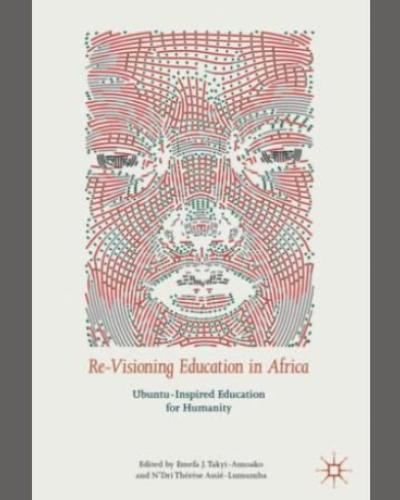
Walking
In this sweet coming-of-age tale, Carole Boyce Davies captures the legend of a man on a secret mission to speed walk around his majestic Caribbean island. But is this rapid moving rebel a madman or are we the crazy ones for standing still while life passes by? Is our speed walker a man ahead of his time? Get ready, get set to go on a high speed tour of your favorite Caribbean island, seen through the eyes of a Caribbean girl.

Freedom from Liberation: Slavery, Sentiment, and Literature in Cuba
By exploring the complexities of enslavement in the autobiography of Cuban slave-poet Juan Francisco Manzano (1797–1854), Gerard Aching complicates the universally recognized assumption that a slave's foremost desire is to be freed from bondage. As the only slave narrative in Spanish that has surfaced to date, Manzano's autobiography details the daily grind of the vast majority of slaves who sought relief from the burden of living under slavery.

Millennium Development Goals (MDGs) in Retrospect: Africa's Development Beyond 2015
This volume examines the impact of the Millennium Development Goals (MDGs) on Africa’s development post-2015. It assesses the current state of the MDGs in Africa by outlining the successes, gaps and failures of the state goals, including lessons learned. A unique feature of the book is the exposition on post-MDG’s agenda for Africa’s development.
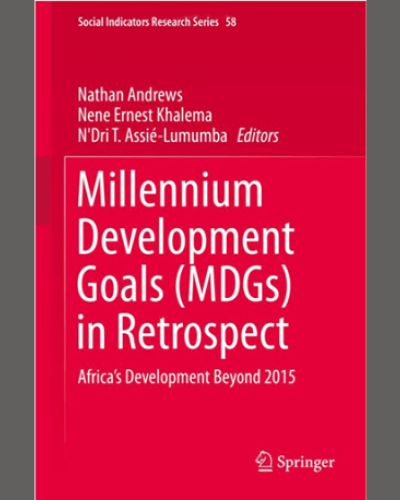
Martin Heidegger Saved My Life
In Martin Heidegger Saved My Life, Grant Farred combines autobiography with philosophical rumination to offer this unusual meditation on American racism. Farred grapples with why it is that Heidegger resonates so deeply with him instead of other, more predictable figures such as Malcolm X, W. E. B. DuBois, or Frantz Fanon.

Measuring and Analyzing Informal Learning in the Digital Age
Investigating some of the primary technologies being used in educational settings and how a less structured and more open learning environment can effectively motivate students and non-traditional learners, this premier reference is a crucial source of information for educators, administrators, theorists, and other professionals in the field of education.
Africa Must Be Modern: A Manifesto
In a forthright and uncompromising manner, Olúfémi Táíwò explores Africa’s hostility toward modernity and how that hostility has impeded economic development and social and political transformation. What has to change for Africa to be able to respond to the challenges of modernity and globalization? Táíwò insists that Africa can renew itself only by fully engaging with democracy and capitalism and by mining its untapped intellectual resources.
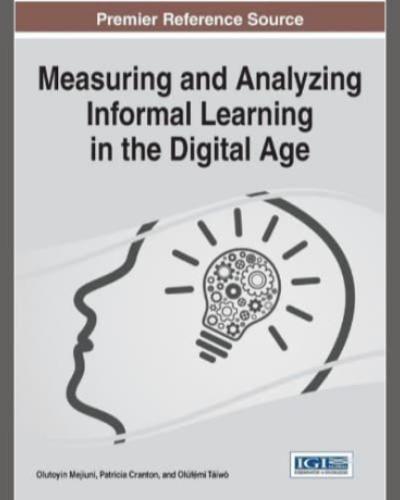
Governance in the Extractive Industries: Power, Cultural Politics and Regulation (Routledge Studies of the Extractive Industries and Sustainable Development)
Greater understanding of the forms and consequences of investment and disinvestment in the extractive industries is required as a result of capitalist expansion, recent declines in global commodity prices, and claims that extractive sector projects, especially in the global south, are poverty reduction projects. This book explores emergent forms of governance in mining and extractive industry projects around the world.
Chapters examine efforts to govern extractive activities across multiple political scales, through intermediaries, instruments, technologies, discourses, and infrastructures. The contributions analyse how multiple micro-processes of rule reverberate through societies to shape the material conditions of everyday life but also politics, social relations, and subjectivities in extractive economies. Detailed case studies are included from Africa (Chad, Nigeria, Rwanda, and São Tomé and Príncipe), Latin America (Bolivia, Ecuador, and Peru), and the UN Climate Conference.

Gender/Class Intersections and African Women's Rights
African women's rights, in its early expressions, was linked to the critique of particular economic/class systems which disempowered the majority of women in contemporary Africa. However, the discourse was subsequently dominated by a move towards feminist politics as cultural politics. The way gender and class intersect in an African context continues to be an ongoing critical lever of analysis, despite some recent turns in the study of African gender systems that have evaded class as a critical variable.
Gender/Class Intersections and African Women's Rights.
Meridians, Vol.13, No. 1 (2015), pp. 1-25
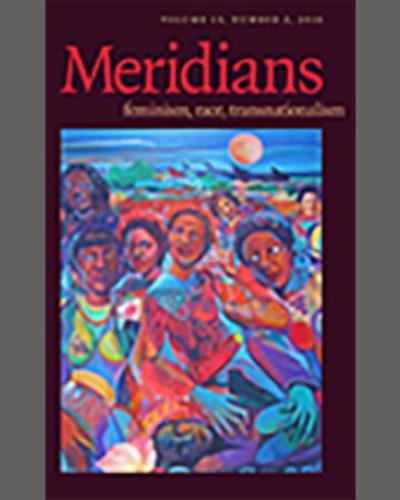
Intricate Entanglement: The ICC and the Pursuit of Peace, Reconciliation and Justice in Libya, Guinea, and Mali
Abstract International justice is not merely a function of legislation and adjudication. It depends on the extent to which it is viewed as legitimate by litigants and others based on perceptions of the relationships of the operations of existing regimes of dispensation of justice. This is a reflection of the operations of the institutions of justice and those of the international order: including but not limited to the actions of judicial authorities and other judicial auxiliaries and intermediaries who give effect to justice through their interpretation and application of the law. From this perspective, justice extends beyond the ability of courts to specify the legal, material and moral dimensions of an offence. International justice has social ends that are easily undermined by self-interested attempts to delegitimize judicial institutions – a charge often levelled at the African Union – but also by the desire of others to preserve, as a matter of political inherency, their own sovereign spaces. Above all, the social ends of social justice, which is the end of international justice, is undermined by elevating judicial or punitive justice over larger social goals – as the examples in this article suggest.
Africa Development, Vol. 40, No. 2 (2015), pp. 99-122

Violence in/and the Great Lakes: The Thought of V-Y Mudimbe and Beyond
This collection is, in the best sense of the term, a homage to Valentin Mudimbe. The festschrift's essays honor the intellectual legacy of Mudimbe - for decades now, one of Africa and the diaspora's most significant minds - by taking up the challenges his work poses, be they ethical, political, philosophical, literary, sociological, anthropological, or psychological challenges. The book gathers a group of US- and Africa-based scholars, many of whom are long-time Mudimbe collaborators and colleagues, who use the questions posed, the critiques and insights offered, and the paradigms constructed by Valentin Mudimbe's oeuvre to understand the implication - and, in some instances, the application - of Mudimbe's work in our moment. In this way, the project is true to Mudimbe's deepest commitment, because the collection, for all the range of its contributions, for all the variegated and often dissonant - yet resonant - ways in which the authors take up Mudimbe's thinking, never strays too far from the historic question of violence and the effects of that violence in the Great Lakes region of Africa, and, indeed, of violence in Africa itself. This is, in every important way, the founding inquiry of Mudimbe's work, and it is sustained in this book. Also, his thoughts are given important new life, new philosophical shape, and new political impetus. Questions continue to haunt his writing and, of course, the continent itself. In so honoring Valentin Mudimbe, the book is grounded in a key contribution by Mudimbe himself. Mudimbe is thus, as has long been his wont, reflecting upon his work in the company of those scholars whose work he has influenced and whom, it is clear, have been important interlocutors for Valentin Mudimbe. (Series: Thinking Africa) [Subject: African Studies, Philosophy, Sociology, Cultural Studies]

Africa Must Be Modern: A Manifesto
Africa must be modern. Let me say it again: Africa must be modern. And it must be modern NOW; not tomorrow; not in the near future; not in the far future.... Put simply, Africa must embrace individualism as a principle of social ordering; make reason central in its relation to, activity upon, understanding of, and production of knowledge about the world, both physical and social, that it inhabits; and adopt progress as its motto in all things. The position just stated is rarely encountered in discourse about, in and on the continent or its Diaspora. On the contrary, no thanks to the militancy and stridency of the nativists, those who wish to celebrate African genius at adapting the wisdom of others and, by so doing, domesticate modernity for the benefit of Africa, Africans, and their life and thought, are practically shouted to silence or, at best, limited to furtive expressions of their preference.From the introduction
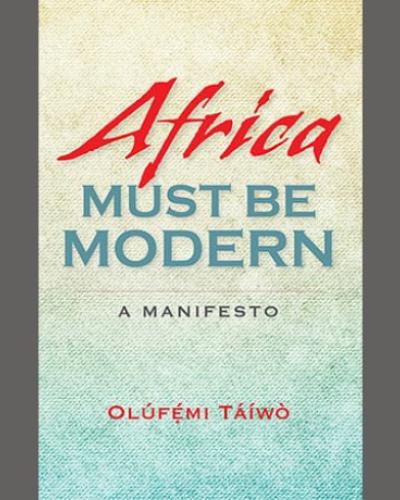
In Motion, At Rest: The Event of the Athletic Body
In Motion, At Rest takes up the event as a philosophical problem from a novel perspective. Grant Farred examines three infamous events in sport, arguing that theorizing the event through sport makes possible an entirely original way of thinking about it.
In the first event, Ron Artest committed a flagrant foul in a National Basketball Association game, which provoked fans to hurl both invectives and beer cups. Artest and some teammates then attacked the fans. Drawing from Alain Badiou, Farred suggests that this event extends far beyond Artest and into the actions of many others, including those of Rosa Parks, Jackie Robinson, and Emmett Till. In the second event Eric Cantona—a professional footballer (soccer player)—was ejected from a game. On his way to the locker room a fan verbally assaulted him, and in response Cantona kicked the fan. Farred utilizes Gilles Deleuze’s insights on cinema to theorize “the most famous kung-fu kick in football.” In the third event, Zinedine Zidane, captain of the French national team, head butted an opposing player. Applying concepts from Jacques Derrida, Farred explores xenophobia and the politics of immigration.
Throughout, Farred shows how what was already inherent in the event is opened to new possibilities for understanding ontological being by thinking about sport philosophically.

Caribbean Spaces - Escapes from Twilight Zone
Drawing on both personal experience and critical theory, Carole Boyce Davies illuminates the dynamic complexity of Caribbean culture and traces its migratory patterns throughout the Americas. Both a memoir and a scholarly study, Caribbean Spaces: Escapes from Twilight Zones explores the multivalent meanings of Caribbean space and community in a cross-cultural and transdisciplinary perspective.
From her childhood in Trinidad and Tobago to life and work in communities and universities in Nigeria, Brazil, England, and the United States, Carole Boyce Davies portrays a rich and fluid set of personal experiences. She reflects on these movements to understand the interrelated dynamics of race, gender, and sexuality embedded in Caribbean spaces, as well as many Caribbean people's traumatic and transformative stories of displacement, migration, exile, and sometimes return. Ultimately, Boyce Davies reestablishes the connections between theory and practice, intellectual work and activism, and personal and private space.

Fanon: Imperative of the Now (South Atlantic Quarterly, Winter 2013)
This collection of essays marks the fiftieth anniversary of the publication of Frantz Fanon’s classic study of anticolonial struggle, The Wretched of the Earth. Scholars explore the relevance of Fanon’s work for current modes of psychoanalysis, postcolonial theory, and political thought. One contributor reposes a classic question of postcolonial scholarship: what does it mean for a colonial Caribbean man to practice a Continental intellectual tradition? Others identify Fanon’s experiences working at a mental institution in colonial French Algeria as a powerful influence on his psychoanalytic perspective. This issue revitalizes Fanon’s canonical status as Third World theorist by asserting that the main imperatives of Fanon’s work remain as urgent as ever: combating the psychic and physical violence of colonialism, achieving real forms of liberation for colonized peoples, and ending the degradation of people of color.
Contributors: Matthew Abraham, Gerard Aching, John E. Drabinski, Grant Farred, Nigel C. Gibson, Priyamvada Gopal, Joy James, Ranjana Khanna, Alfred J. López, Miguel Mellino, Simon Morgan Wortham, Richard Pithouse
Grant Farred is Professor of Africana Studies and English at Cornell University. He is the former editor of the South Atlantic Quarterly and the author, most recently, of Long Distance Love: A Passion for Football.
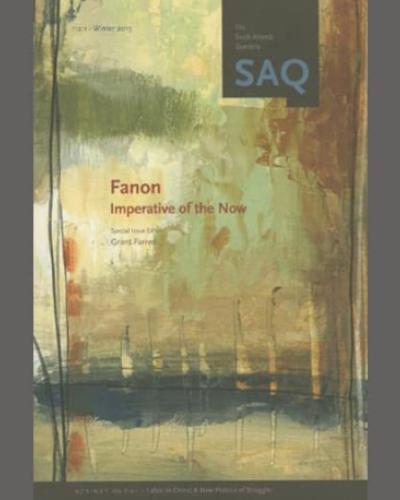
Ibrahim El-Salahi: A Visionary Modernist
Ibrahim El-Salahi is one of the most influential figures in Sudanese modern art. Through his extraordinary artwork and remarkable writing and art criticism, he has made foundational contributions to the modernist movements in Africa and the Arab world. In his paintings, drawings, and illustrations, he engages with an array of traditional African, Arab, and Islamic visual sources as well as European art movements. His unique style transcends geographic and cultural boundaries and has inspired artists in Sudan and elsewhere in Africa for generations.
El-Salahi's art offers profound possibilities for understanding African and Arab modernisms and repositioning them within the context of a broader, global modernity. This book brings together more than five decades of his work, tracing a personal journey that originates in Sudan and leads to the artist's international schooling, his detention as a political prisoner in his home country, his self-imposed exile in Qatar, and his current life in the United Kingdom.
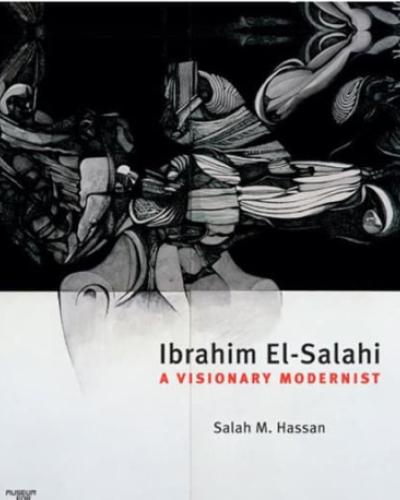
Salah M. Hassan: How to Liberate Marx from His Eurocentrism Notes on African/Black Marxism: 100 Notes, 100 Thoughts: Documenta Series 091
Published in conjunction with the Documenta 13 exhibition in Kassel, Germany, the Documenta notebook series 100 Notes,100 Thoughts ranges from archival ephemera to conversations and commissioned essays. These notebooks express director Carolyn Christov-Bakargiev’s curatorial vision for Documenta 13.

The Politics of Spanish American 'Modernismo': By Exquisite Design
The Politics of Spanish American "Modernismo" elucidates the professional and literary means through which Spanish American modernistas negotiated a cultural politics of rapprochement with Spain and Europe in order to differentiate their Americanness from that of the United States. Gerard Aching argues that these turn-of-the-century men of letters were in fact responsible for the burgeoning role that intellectuals and writers had (and continue to have) in defining pan-Hispanicism. Aching's arguments contribute to current debates about modernity and the colonial/postcolonial condition in nineteenth-century Hispanic literatures.
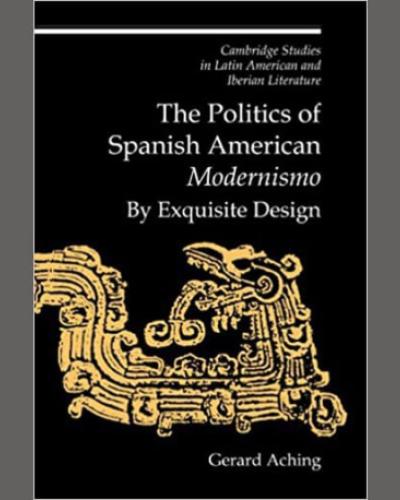
How Colonialism Preempted Modernity in Africa
Why hasn't Africa been able to respond to the challenges of modernity and globalization? Going against the conventional wisdom that colonialism brought modernity to Africa, Olúfémi Táíwò claims that Africa was already becoming modern and that colonialism was an unfinished project. Africans aspired to liberal democracy and the rule of law, but colonial officials aborted those efforts when they established indirect rule in the service of the European powers. Táíwò looks closely at modern institutions, such as church missionary societies, to recognize African agency and the impulse toward progress. He insists that Africa can get back on track and advocates a renewed engagement with modernity. Immigration, capitalism, democracy, and globalization, if done right this time, can be tools that shape a positive future for Africa.
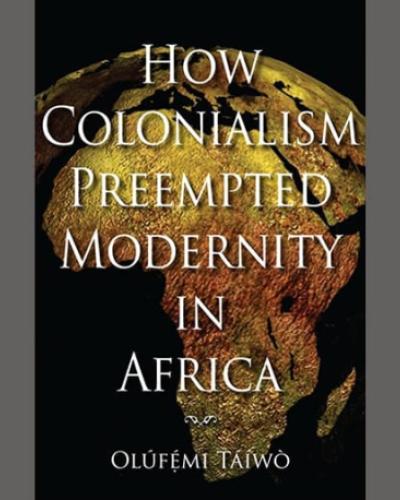
Sovereigns, Quasi Sovereigns, and Africans: Race and Self-Determination in International Law
Sovereigns, Quasi Sovereigns, and Africans was first published in 1996. Minnesota Archive Editions uses digital technology to make long-unavailable books once again accessible, and are published unaltered from the original University of Minnesota Press editions.
In this trenchant critique, Siba N'Zatioula Grovogui demonstrates the failure of international law to address adequately the issues surrounding African self-determination during decolonization. Challenging the view that the only requirement for decolonization is the elimination of the legal instruments that provided for direct foreign rule, Sovereigns, Quasi Sovereigns, and Africans probes the universal claims of international law.
Grovogui begins by documenting the creation of the "image of Africa" in European popular culture, examining its construction by conquerors and explorers, scientists and social scientists, and the Catholic Church. Using the case of Namibia to illuminate the general context of Africa, he demonstrates that the principles and rules recognized in international law today are not universal, but instead reflect relations of power and the historical dominance of specific European states.
Grovogui argues that two important factors have undermined the universal applicability of international law: its dependence on Western culture and the way that international law has been structured to preserve Western hegemony in the international order. This dependence on Europeandominated models and legal apparatus has resulted in the paradox that only rights sanctioned by the former colonial powers have been accorded to the colonized, regardless of the latter's needs. In the case of Namibia, Grovogui focuses on the discursive strategies used by the West and their southern African allies to control the legal debate, as well as the tactics used by the colonized to recast the terms of the discussion.
Grovogui blends critical legal theory, historical research, political economy, and cultural studies with profound knowledge of contemporary Africa in general and Namibia in particular. Sovereigns, Quasi Sovereigns, and Africans represents the very best of the new scholarship, moving beyond narrow disciplinary boundaries to illuminate issues of decolonization in Africa.
Siba N'Zatioula Grovogui is assistant professor of political science at Johns Hopkins University. He previously practiced law in his native Guinea.
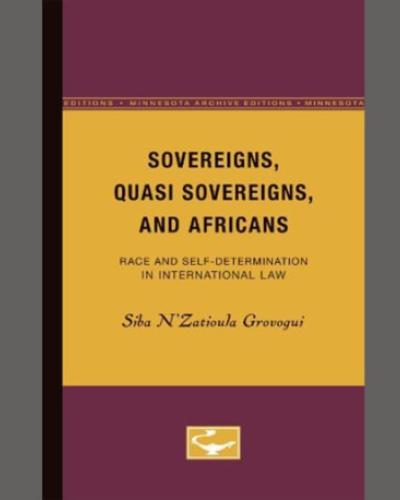
Long Distance Love: A Passion for Football (Sporting)
Since he was a young adult, Grant Farred has wandered the world. Born in South Africa, his own personal growth was fueled by dreams of English football, as a player, and then, when age and reality set in, as a fan. Coming to the United States at a still young age, Farred still loved football -- especially Liverpool -- and watched it from afar. Writing about his experience, Farred shares with the reader his experience growing up colored in South Africa, moving to England, and finally to the US, and how his passion for football kept company with his many moves. Along the way, he talks about the contradictions of football; how race and class politics mix on and off the pitch; how Farred's own ideas about what it means to be a colonial subject is both reinforced and liberated by the idea of football, and how players can serve as gods and mosnters.

Black Masculinity and the U.S. South: From Uncle Tom to Gangsta (The New Southern Studies Ser.)
This pathbreaking study of region, race, and gender reveals how we underestimate the South's influence on the formation of black masculinity at the national level. Many negative stereotypes of black men―often contradictory ones―have emerged from the ongoing historical traumas initiated by slavery. Are black men emasculated and submissive or hypersexed and violent? Nostalgic representations of black men have arisen as well: think of the philosophical, hardworking sharecropper or the abiding, upright preacher. To complicate matters, says Riché Richardson, blacks themselves appropriate these images for purposes never intended by their (mostly) white progenitors.
Starting with such well-known caricatures as the Uncle Tom and the black rapist, Richardson investigates a range of pathologies of black masculinity that derive ideological force from their associations with the South. Military policy, black-liberation discourse, and contemporary rap, she argues, are just some of the instruments by which egregious pathologies of black masculinity in southern history have been sustained. Richardson's sources are eclectic and provocative, including Ralph Ellison's fiction, Charles Fuller's plays, Spike Lee's films, Huey Newton's and Malcolm X's political rhetoric, the O. J. Simpson discourse, and the music production of Master P, the Cash Money Millionaires, and other Dirty South rappers.
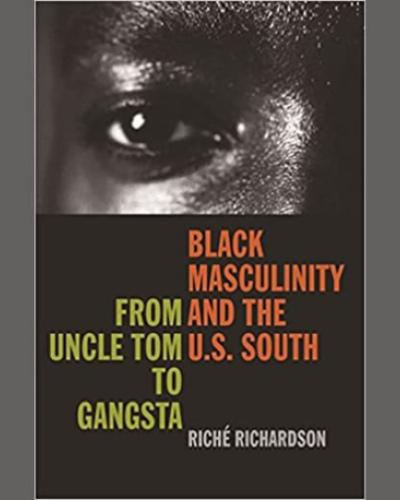
Women and Higher Education in Africa: Reconceptualizing Gender-based Human Capabilities and Upgrading Human Rights to Knowledge
Women and Higher Education in Africa: Reconceptualizing Gender-based Human Capabilities and Upgrading Human Rights to Knowledge is a pioneering book that provides theoretical articulation of the quest for relevant development paradigms and policy conceptualization to address effectively the urgent need for Africa collectively to appropriate the process of genuine progress. Noted scholars and policy analysts address, in 16 chapters, complex issues that are central to the relevant analysis and understanding of the interface between gender, higher education, and the production of knowledge as a means for agency, reclaiming of human rights, and a source for informed participation in social processes. They have explored the issues surrounding the basic fundamental right of women to higher education and argued the importance of women's access to higher education if African societies and countries are to break the cycle of poverty and human misery. This is a hopeful book with authoritatively articulated and compelling arguments for the full utilization of human capabilities and the fulfillment of the African women's rights to learning in all areas and at all levels of educational systems including higher education.
This book has also been published in several languages including French & Arabic.
Left of Karl Marx: The Political Life of Black Communist Claudia Jones
In Left of Karl Marx, Carole Boyce Davies assesses the activism, writing, and legacy of Claudia Jones (1915–1964), a pioneering Afro-Caribbean radical intellectual, dedicated communist, and feminist. Jones is buried in London’s Highgate Cemetery, to the left of Karl Marx—a location that Boyce Davies finds fitting given how Jones expanded Marxism-Leninism to incorporate gender and race in her political critique and activism.
Claudia Cumberbatch Jones was born in Trinidad. In 1924, she moved to New York, where she lived for the next thirty years. She was active in the Communist Party from her early twenties onward. A talented writer and speaker, she traveled throughout the United States lecturing and organizing. In the early 1950s, she wrote a well-known column, “Half the World,” for the Daily Worker. As the U.S. government intensified its efforts to prosecute communists, Jones was arrested several times. She served nearly a year in a U.S. prison before being deported and given asylum by Great Britain in 1955. There she founded The West Indian Gazette and Afro-Asian Caribbean Newsand the Caribbean Carnival, an annual London festival that continues today as the Notting Hill Carnival. Boyce Davies examines Jones’s thought and journalism, her political and community organizing, and poetry that the activist wrote while she was imprisoned. Looking at the contents of the FBI file on Jones, Boyce Davies contrasts Jones’s own narration of her life with the federal government’s. Left of Karl Marx establishes Jones as a significant figure within Caribbean intellectual traditions, black U.S. feminism, and the history of communism.
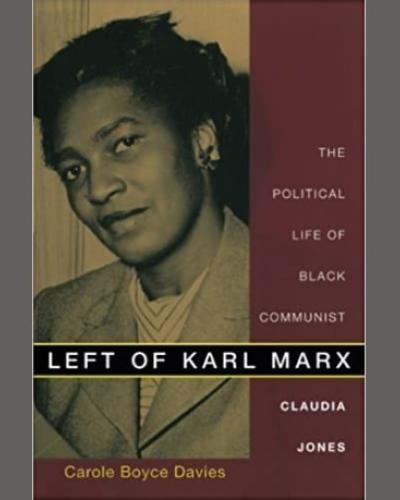
Phantom Calls: Race and the Globalization of the NBA
In the twenty-first century, the idea of race in sports is rapidly changing. The National Basketball Association, for instance, was recently home to a new kind of racial conflict. After a recent playoff loss, Houston head coach Jeff Van Gundy alleged that Yao Ming, his Chinese star center, was the victim of phantom calls, or refereeing decisions that may have been ethnically biased. Grant Farred here shows how this incident can be seen as a pivotal moment in the globalization of the NBA. With some forty percent of its players coming from foreign nations, the idea of race in the NBA has become increasingly multifaceted. Farred explains how allegations of phantom calls such as Van Gundy’s challenge the fiction that America is a post-racial society and compel us to think in new ways about the nexus of race and racism in America.
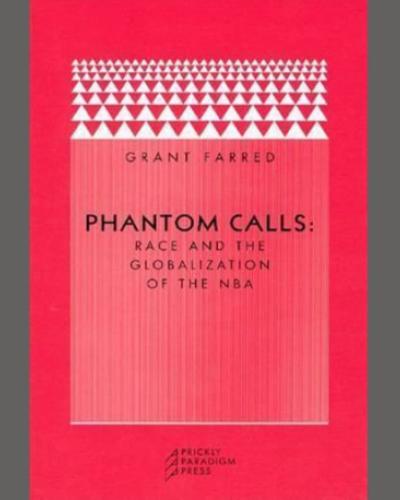
Beyond Eurocentrism and Anarchy: Memories of International Order and Institutions (Culture and Religion in International Relations)
This book reevaluates "international knowledge" in light of recent scholarship in the fields of hermeneutics, ethnography, and historiography regarding the non-West, the past, and the present of international society. Countering the disciplinary skepticism about political possibilities outside of the strictures of modern Western forms, it proposes formulations of power, interest, ethics, and subjectivity by a group of African intellectuals as plausible alternatives to official French and American postwar proposals for world order.
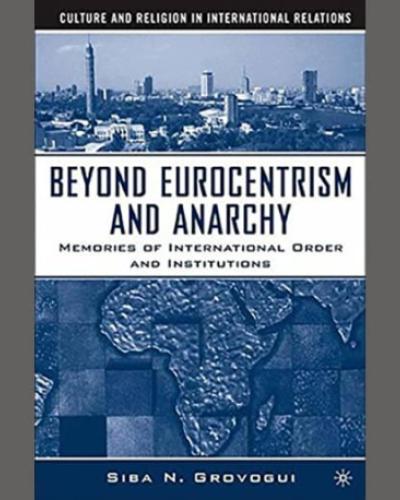
Higher Education in Africa. Crises, Reforms and Transformation
This book provides theoretical tools for analysing contemporary African higher education systems and institutions. It also examines policy challenges and the prospects for social progress. It points to critical areas of investigation for the CODESRIA Multinational Working Group (MWG) research network on higher education. Conceived as a background text for this network, the book traces the historical roots and the global factors of the African higher education crises and the search for transformation to address issues of legitimacy and relevance. It analyses the origins, nature, and mission of African higher education, the problems associated with cultural colonization and the dependency trap, the local/global nexus in the crises with a special attention to the structural adjustment programmes (SAPs), and the various waves of reforms and innovations. Furthermore, the book presents a synopsis of studies that were conducted on the crises, highlighting both their findings and recommendations. The new challenges within the global and local objective conditions of globalisation, the debt burden, the disruptive impact of violence and armed conflicts, and human resource loss due to HIV/AIDS and brain drain are also discussed. Finally, the book examines the potential for higher education as a public good to promote structural change by productively using African assets including indigenous knowledge within a philosophy of fusion, and Africans in the Diaspora. It argues for the need to vigorously engender African higher education, and creatively appropriate new opportunities such as the selective use of information and communication technologies and decolonized partnerships in the global context. N'Dri T. Assié-Lumumba is a Fellow of the World Academy of Art and Science. She was trained as an educator (comparative education: economics and sociology), a sociologist and historian. She teaches at the Africana Studies and Research Center, Cornell University, USA. Professor Assié-Lumumba has published extensively on higher education, educational systems, gender, women and development issues. Her works cover the use of information and communication technologies for education delivery, and critically address issues of continued domination and exploitation in the transfer of technology from the North to the global South and the social reproduction of gender inequality through the use of technology in educational processes. Her publications include: Les Africaines dans la politique: femmes Baoulé de Côte d'Ivoire (L'Harmattan: 1996); African Voices in Education, co-edited (Juta: 2000); and Cyberspace, Distance Learning, and Higher Education in Developing Countries, edited (Brill: 2004).
Cyberspace, Distance Learning, and Higher Education in Developing Countries
Amidst the euphoria about the new frontiers of technology sometimes perceived as a panacea for expansion of higher education in developing countries, there is a need to analyze persistent and new grounds of unequal opportunity for access, learning, and the production of knowledge. This volume addresses fundamental questions about the educational process such as: - The use of technology in higher education for a holistic educational system for social development - The actual technological capacity in Africa and possibilities for virtual higher education - Cultural relevance of the curriculum and pedagogy - Pedagogy and gender in cyberspace education - Perils of externally-driven distance education programs in Africa and the quest for ownership towards development - Challenges and opportunities in the making of knowledge society in an Asian context - Strategies to promote constructive virtual higher education in Africa and Asia.
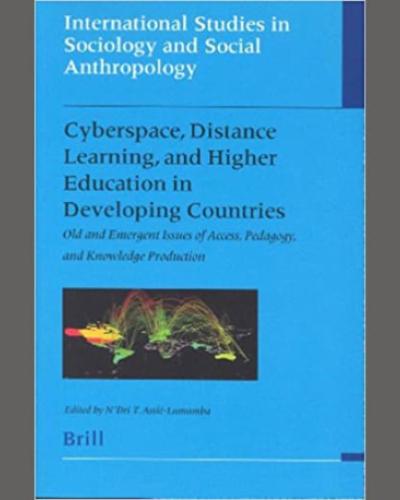
What's My Name?: Black Vernacular Intellectuals
Whom does society consider an intellectual and on what grounds? Antonio Gramsci’s democratic vision of intelligence famously suggested that “all men are intellectuals,” yet within academic circles and among the general public, intellectuals continue to be defined by narrow, elite criteria.
In this study of four celebrated citizens of the African diaspora—American boxer Muhammad Ali, West Indian Marxist critic C. L. R. James, British cultural theorist Stuart Hall, and Jamaican musician Bob Marley—Grant Farred develops a new category of engaged thinker: the vernacular intellectual. Extending Gramsci’s concept of the organic intellectual, Farred conceives of vernacular intellectuals as individuals who challenge social injustice from inside and outside traditional academic or political spheres. Muhammad Ali, for example, is celebrated as much for his dazzling verbal skills and courageous political stands as for his pugilistic talents; Bob Marley’s messages of liberation are as central to his popularity as his lyrical and melodic sophistication. Neither man is described as an intellectual, yet both perform crucial intellectual functions: shaping how people see the world, oppose hegemony, and understand their own history. In contrast, the careers of C. L. R. James and Stuart Hall reflect a dynamic blend of the traditional and the vernacular. Conventionally trained and situated, James and Hall examine racism, history, and the lasting impact of colonialism in ways that draw on both established scholarship and more popular cultural experiences.
Challenging existing paradigms, What’s My Name offers an expansive and inclusive vision of intellectual activity that is as valid and meaningful in the boxing ring, the press conference, and the concert hall as in academia.

Masking and Power: Carnival and Popular Culture in the Caribbean
Does the mask reveal more than it conceals? What, this book asks, becomes visible and invisible in the masking practiced in Caribbean cultures -- not only in the familiar milieu of the carnival but in political language, social conduct, and cultural expressions that mimic, misrepresent, and mislead? Focusing on masking as a socially significant practice in Caribbean cultures, Gerard Aching's analysis articulates masking, mimicry, and misrecognition as a means of describing and interrogating strategies of visibility and invisibility in Cuba, Trinidad and Tobago, Martinique, and beyond.
Masking and Power uses ethnographic fieldwork, psychoanalysis, and close literary readings to examine encounters between cultural insiders as these locals mask themselves and one another either to counter the social invisibility imposed on them or to maintain their socioeconomic privileges. Aching exposes the ways in which strategies of masking and mimicry, once employed to negotiate subjectivities within colonial regime, have been appropriated for state purposes and have become, with the arrival of self-government in the islands, the means by which certain privileged locals make a show of national and cultural unity even as they engage in the privatization of popular culture and its public performances.

Legal Naturalism: A Marxist Theory of Law
Legal Naturalism advances a clear and convincing case that Marx's theory of law is a form of natural law jurisprudence. It explicates both Marx's writings and the idea of natural law, and makes a forceful contribution to current debates on the foundations of law.
Olufemi Taiwo argues that embedded in the corpus of Marxist writing is a plausible, adequate, and coherent legal theory. He describes Marx's general concept of law, which he calls "legal naturalism." For Marxism, natural law isn't a permanent verity; it refers to the basic law of a given epoch or social formation which is an essential aspect of its mode of production. Capitalist law is thus natural law in a capitalist society and is politically and morally progressive relative to the laws of preceding social formations.
Taiwo emphasizes that these formations are dialectical or dynamic, not merely static, so that the law which is naturally appropriate to a capitalist economy will embody tensions and contradictions that replicate the underlying conflicts of that economy. In addition, he discusses the enactment and reform of "positive law"―law established by government institutions―in a Marxian framework.

Rethinking C.L.R. James
This collection of essays provides a critique of C. L. R. James's contribution to a broad range of intellectual pursuits. The Trinidadian-born James was a political activist in the Caribbean, the US and Britain, as well as being one of the leading figures in the early Pan-African movement. He also wrote extensively on literature, culture, cricket, and marxism. This book engages all these aspects of James's life to demonstrate his centrality to the current debates around the issues of postcoloniality and popular culture.
James, for too long unavailable to readers, is presented as an intellectual who participated in several key historical developments of the twentieth century. The book locates him in the history of the earliest struggles against colonialism, but it also clearly shows how his thinking - particularly his interest in nineteenth-century British literature - was shaped by the experience of growing up as a colonial subject in Port-of-Spain. The collection grapples with the paradoxes, the tensions, and ironies that characterized James as much as it shows how creatively he applied the lessons of those ambiguities and contradictions.
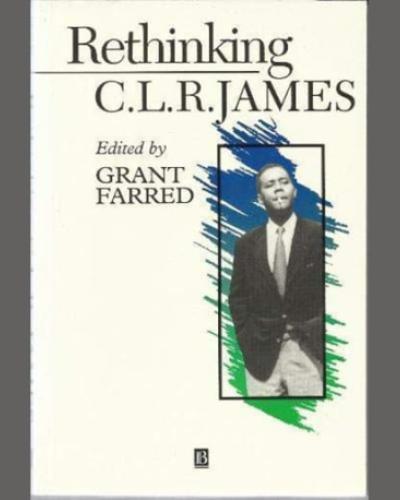
Ngambika: Studies of Women in African Literature
Ngambika is a Tshiluba (Central Africa) phrase whose closest english rendition is "Help Me To Balance This Load." An African woman who has to carry a heavy load often asks another woman to help her lift it onto her head while she finds the correct posture and balance to choulder the weight herself. In most cases, the load is within her capability, so she balances it herself without assistance. This balancing process is the symbolic representation of the balance between woman's emancipation and commitment to total African liberation that is at the core of this book.
The criticism in Ngambika: Studies of Women in African Literature is concerned with expanding and augmenting the interpretation of the whole body of African literary creativity. It is a concerted attempt to redress the relative inattention to women in African literary sholarship. towards this end, the editorial and ideological orientation here is not just around the works of women writers (and critics), but around African writers ranging from Buchi Emecheta and Wole Soyinka to Mariama Ba and Ngugi wa Thiong'o.
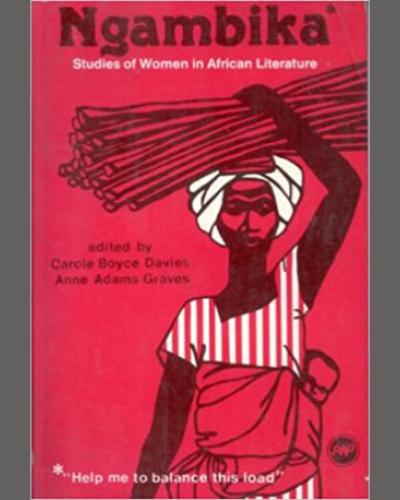
Les Africaines Dans La Politique
This book is a case study of the political system and practices of the Baoulés, an Akan group in Côte d’Ivoire, who migrated from current Ghana in the 18th Century under the leadership of Queen Nanan Abla Pokou. Prior to French colonial rule in Côte d’Ivoire from the end of the 19th Century to its independence in 1960, Baoulé women, like other women of the global African world, constituted a significant, central and indispensable force in all spheres of society, including politics. They fought fiercely in all facets of anti-colonial struggles. However colonial rule and ideologies, which emulated the European traditions of the time, marginalized African women considerably, taking away their power. Based on the analysis of archival and socio-historical data collected for this empirical research, the author calls for the restoration of African women’s rights in education, the political arena and broader representation, a sine qua non for social progress in Africa.
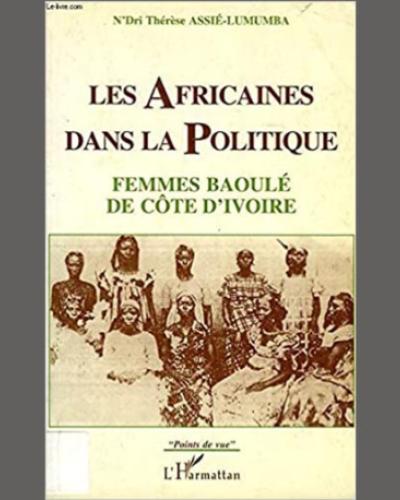
MUJERES EN AFRICA: EDUCACION Y PODER. EL ACCESO A LOS ESTUDIOS SU PERIORES
No es frecuente destacar el importante aporte de las mujeres africanas en las "altas" esferas de la estructura de las sociedades y, menos aún, explicitar su existencia, presencia y potencia en la educación superior con todas sus derivaciones y consecuencias actuales y futuras. De ahí la importancia especial de este libro y de las informaciones, reflexiones y propuestas hechas por mujeres universitarias africanas que se han unido para afirmar con fuerza su postura llena de preguntas y cuestiones abiertas lanzadas a todos los vientos que soplaron en la historia reciente y que actualmente deberían remover y romper el sinfín de estereotipos y tópicos que llenan determinados discursos. Defender como un principio absoluto que el cambio de África hacia su Futuro nuevo vendrá de manos de sus mujeres organizadas y consolidadas en las nuevas estructuras del Poder cultural, económico y, sobre todo, político, ético y jurídico, no conlleva ninguna profecía vacía sino la evidencia de que ellas son las únicas protagonistas capaces de tanta y tan profunda subversión.
